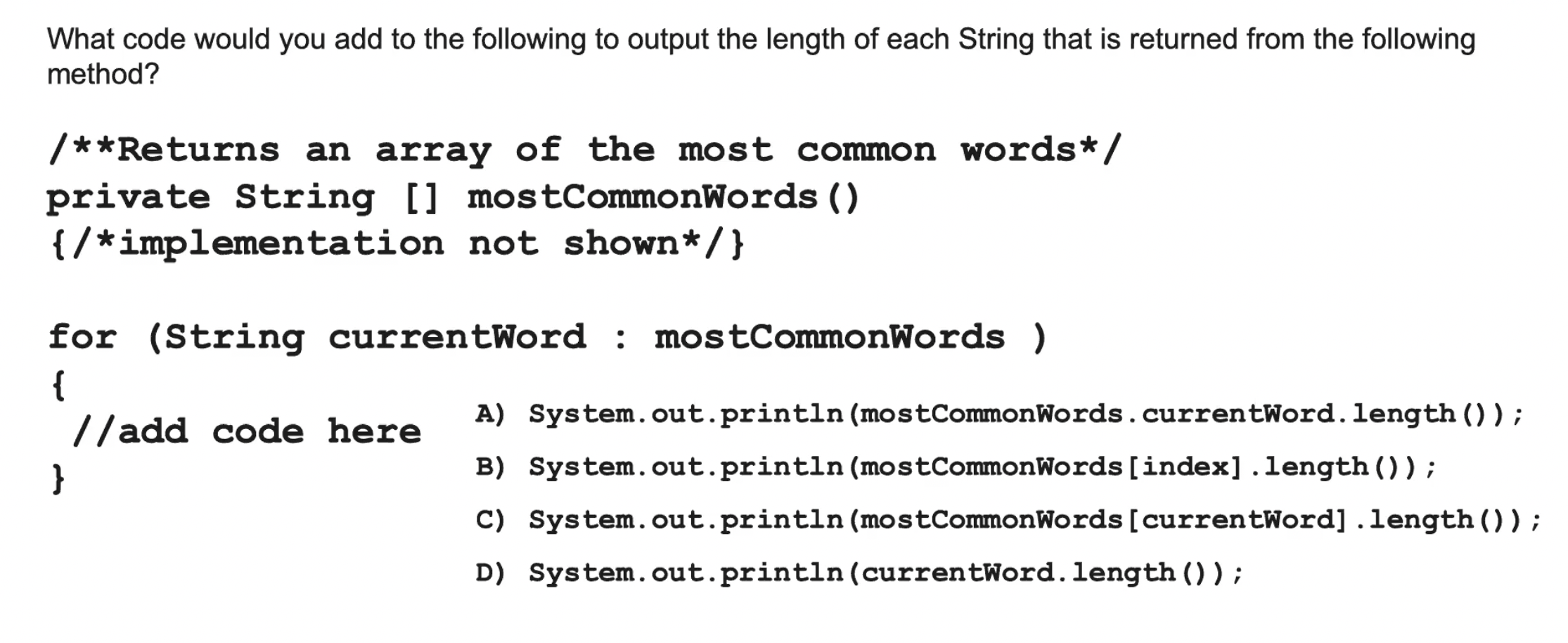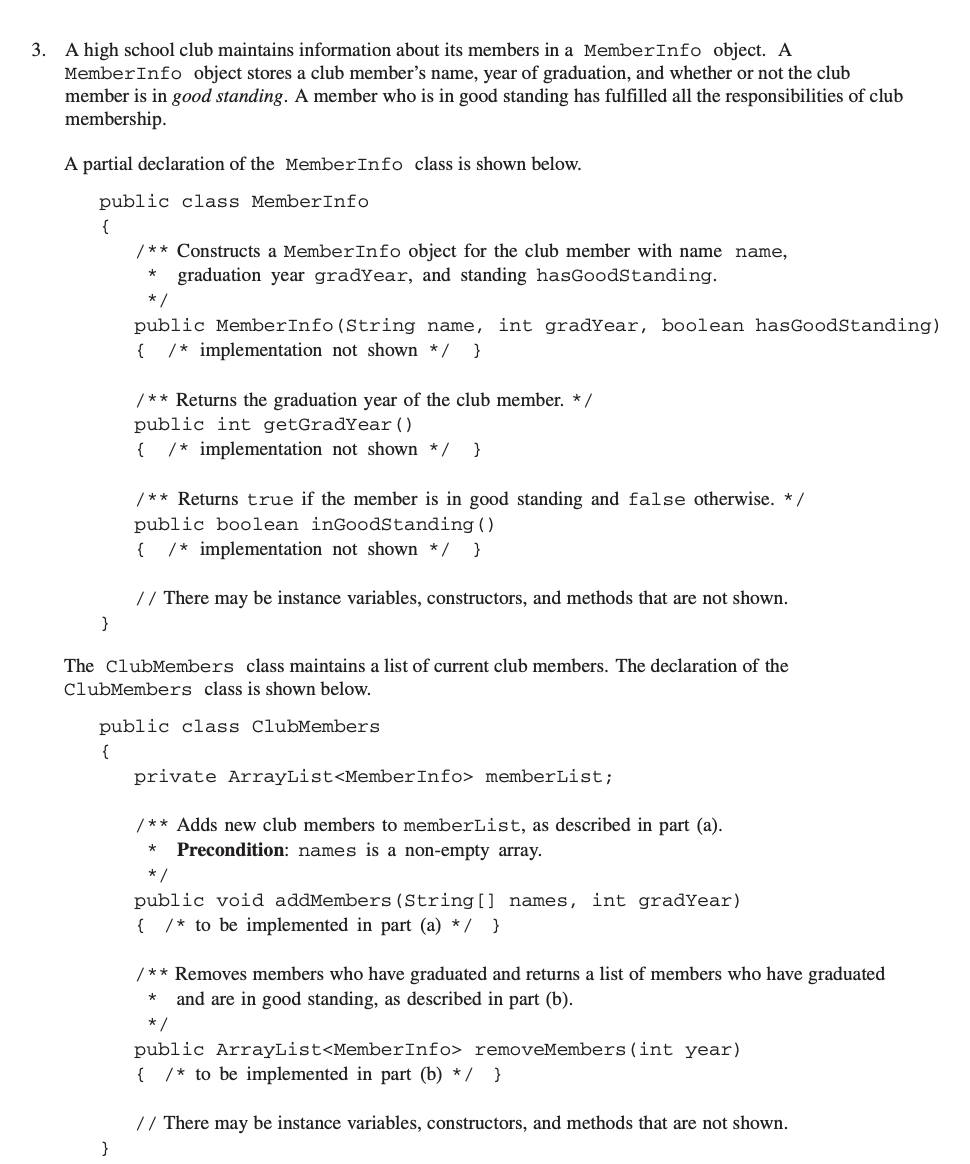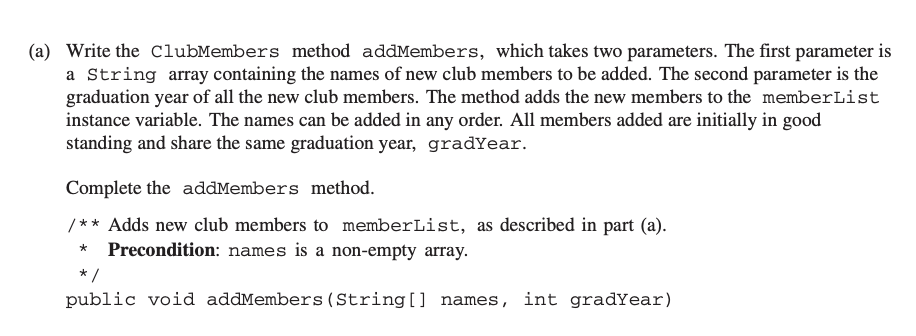Array Lesson - Team 5
a lesson about arrays made by Team 5
Arrays Overview
- Arrays are 10-15% of the AP CSA Exam
- The four main topics that College Board wants you to know
- Array creation and access
- Traversing arrays
- Enhanced for loops for arrays
- Developing algorithms using arrays
- The overall purpose of arrays is to store multiple values in a single variable, instead of declaring separate variables for each value.
6.1 Array Creation and Access
- Arrays are used to store one data type
- Unlike Arraylists, arrays have a fixed size and cannot be changed
- Arrays can be denoted using braces {}
Below is an example of a simple array storing our scrum team names
[Meena, Shraddha, Madhumita, Pranavi] - To use an array you have to use the command
import java.util.Arrays;
Making Arrays
There are two ways to make arrays
- using constructors
- using pre-intiliazed arrays
dataType[] arrayName = new dataType[numberOfItems]; //Constructor
int[] arraySample = {1,3,5,7,9}; //pre-initialized arrays
arrayName.Length //determine the size
arrayName.length - 1 //to access the last item in the array
int[] arrayOne = {1, 3, 5, 7, 9};
// Here is the array we will be working with
String[] myFruits = new String[] {"Apple", "Strawberry", "Watermelon", "Blueberry"};
for (int i = 0; i < myFruits.length; i++) {
System.out.println("Fruit number " + i + " is " + myFruits[i]);
}
- Can also loop through an array in reverse
for (int i = myFruits.length - 1; i >= 0 ; i--) {
System.out.println("Fruit number " + i + " is " + myFruits[i]);
}
- If we have a list of numbers, we could change each value in the array by a certain amount
// Here is the array we will be working with
int[] myNumbers = new int[] {1, 3, 5, 7, 9};
for (int i = 0; i < myNumbers.length; i++) {
// add 10 to each element in the array
myNumbers[i] += 10;
System.out.println("New element " + i + " is " + myNumbers[i]);
}
- We can also traverse an array using a while loop
// Here is the array we will be working with
String[] myFruits = new String[] {"Apple", "Strawberry", "Watermelon", "Blueberry"};
int i = 0;
while (i < myFruits.length) {
System.out.println("Fruit number " + i + " is " + myFruits[i]);
i++;
}
Bound Errors
ArrayIndexOutOfBoundsExceptionthrown, can happen when using loops to access array elements- In the example below instead of the condition being while the index is less than the length of the array, the condition is less than or equal too
- This mean the loop will try to run when i = 4 (since the length of the list is 4). However since array index starts from 0, the last item in the array will have an index of 3. So, index of 4 will be out of bounds, resulting in the error.
int i = 0;
while (i <= myFruits.length) {
System.out.println("Fruit number " + i + " is " + myFruits[i]);
i++;
}
for ( int k = 0; k < a.length; k++ )
{
while ( a[ k ] < temp )
{
a[ k ] *= 2;
}
}
- A. The values don't matter this will always cause an infinite loop.
- B. Whenever a includes a value that is less than or equal to zero.
- C. Whenever a has values larger then temp.
- D. When all values in a are larger than temp.
- E. Whenever a includes a value equal to temp.
6.3 Enhanced for loop for Arrays
This topic was pretty short, but essentially what you need to know is about the enhanced for loop. The enhanced for loop can be used to traverse through most data structures (i.g. arrays). However, it can only traverse in a forward direction. Usually the structure is like so
for (dataType i: arrayName) {
do something with i
}Essentially, this code mentions how every element in the array (i) has to have something done to it. It's important to note that although there is access to the element i, but it isn't possible to change the value/set new values to element i.
We can use mutator methods on objects on the array to set the value of their instance variables. This is because i is a copy of the object reference, which means that i refers to the same object as the array element, so calling methods on i is the same as calling methods on the individual array elements themselves. For example
public class Student {
private String name;
/** Sets the name of the Student
*/
public void setName(String name) {
this.name = name;
}
/** Other instance variables, methods, and constructors not shown
*/
}
// IN ANOTHER CLASS
/** Resets all students' names
*/
public static void doubleArray(Student[] array, String defaultName) {
for (Student student: array) {
student.setName(defaultName); // Sets each student's name to a default name
}
}
public class ForEachDemo
{
public static void main(String[] args)
{
int[] highScores = { 10, 9, 8, 8};
String[] names = {"Jamal", "Emily", "Destiny", "Mateo"};
// for each loop with an int array
for (int value : highScores)
{
System.out.println( value );
}
// for each loop with a String array
for (String value : names)
{
System.out.println(value); // this time it's a name!
}
}
}

6.4 Developing Algorithms using Arrays
Here are some algorithms that arrays can be used for (from college board standards),
- Minimum and Maximum of a list of elements
- Compute the sum, average, or mode of multiple elements
- Determine if at least one element has a property
- Access consecutive pairs of elements
- Determine duplicates
What to use when problem solving with arrays
.length can be used to find the length of an array
- The value at a specific index can be found with
array[i], whereiis the index - An element at index
ican be replaced usingarray[i] = new element - You can iterate over an array with a for loop
for(type element: array) { \\\\ code here
Computing Sums with Arrays
See the code below for a sample algorithm of how to compute the sum of elements in an array. This could be applied to finding the mean, standard deviation, or any other algorithm that requires summation.
int[] array = {5, 1, 78}; // intialize
int sum = 0; // variable to keep track of sum
for (int number; array) { // iterates over each loop in the array
sum += number; // the number is added to the sum
}
System.out.println(sum); //expected sum is 84, so 84 should be printed
// from college board
private double findMax(double[] values) {
double max = values[0]; // initialize max with first element of array
for(int i=1; i<values.length; i++) { // starting with the second element, iterate over the rest of the array
if (values[i] > max) { // if the current element is greater than the max
max = values[i]; // set the max equal to the greatest value until that point
}
}
return max;
}
private int findEvenNumbers(int[] values) {
int evenCount = 0; // initalize count of even numbers to zero
for(int value: values) { // iterate over every element of array
if(value % 2 == 0) { // use modulus operator to check if value is even
evenCount += 1; // increment evenCount if the value is even
}
}
return evenCount;
}

